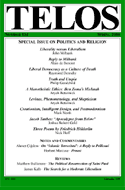Each Tuesday in the TELOSscope blog, we reach back into the archives and highlight an article whose critical insights continue to illuminate our thinking and challenge our assumptions. Today, Timothy Stacey looks at Philip Goodchild’s “Truth and Utopia,” from Telos 134 (Spring 2006).
 In the wake of the global economic meltdown, it is once again time to reassess the parameters of the free market. Politicians would have us believe that this reassessment can stand outside of ideology, offering us a clear choice at the ballot between the can-dos and the has-beens of fiscal responsibility. In his article “Truth and Utopia,” Philip Goodchild reveals how this attitude is philosophically misguided, using as it does contingencies of human error as scapegoats for deeper faults of the economy. For Goodchild these faults, alongside those of technology and science, reside in modern optimism, founded on the propositional model of truth, a model that presupposes the positivist Parmenidean maxim truth is true:
In the wake of the global economic meltdown, it is once again time to reassess the parameters of the free market. Politicians would have us believe that this reassessment can stand outside of ideology, offering us a clear choice at the ballot between the can-dos and the has-beens of fiscal responsibility. In his article “Truth and Utopia,” Philip Goodchild reveals how this attitude is philosophically misguided, using as it does contingencies of human error as scapegoats for deeper faults of the economy. For Goodchild these faults, alongside those of technology and science, reside in modern optimism, founded on the propositional model of truth, a model that presupposes the positivist Parmenidean maxim truth is true:
On the one hand, the propositional model of truth, embedded in science, finds its proofs in practice through technology. The truth of this model seems to be effectively revealed through mastery of nature: thinking constructs being. On the other hand, the propositional model of truth demonstrates its rectitude through political economy. Economics is the moral discipline founded on an appeal to the evidence, based on the propositional model of truth. In spite of claims to moral neutrality, political economy constitutes itself as a morality that displaces competing moral claims. (73)
Now, because truth is true for all times and peoples, how we arrive at truth is also irrelevant. The standard for truth is the mastery of nature. And the standard for good method is the speed with which a result is produced. This harks back to Heidegger’s The Question Concerning Technology, wherein modernism is defined by the attempt to enframe truth and put it to practical use. The global economic crisis is a timely reminder of this practice: A few brilliant MIT mathematicians enframe truth in a few complex formulas believed capable of nullifying risk. Goodchild strikes further into the heart of this problem: modernism’s true shortcoming is its divide between thought and being. A mathematic formula, rigid and timeless, can never encapsulate something as spontaneous as the economy, involving as it does the chaotic relation of billions of human beings to each other and to their environment. Taking functionality as the standard of truth is to neglect the temporality of functionality.
Let us therefore propose a different experiment with truth. The Parmenidean hypothesis is utopian: truth is not yet true. The same thing is not yet for thinking and for being. Alongside thinking and being, we do not yet have a third term that unites them, but we do have a faith in their unity, a utopian aspiration. It is time for philosophy to take this credit or piety seriously as a potential mediator for being and thought. We need not pretend to understand how being is mediated to thought. There is an excess in being over thought that may be gradually disclosed in experience. Only as such can we begin to think the new, for thinking and being take time. Let us acknowledge the incompleteness of truth. Truth, if it ever is to come, will only become true in utopia. (75)
“Truth and Utopia” admonishes that if truth is not yet true, then the lessons of the past are more important than the innovations of the present. In economic terms, this means taking the Wall Street crash as a greater truth than the eureka moment of a few mathematicians—even if they did go to MIT. What we do next is inherently political. Whether we reassess our formulae or reassess our understanding of economics, we must begin by reassessing our attitude towards truth.
Read the full version of Philip Goodchild’s “Truth and Utopia” at the TELOS Online website. If you are affiliated with an institution that is an online subscriber to Telos, you have free access to our complete online archive. If not, you can purchase 24-hour access to this and other Telos articles at the low rate of $5/article.








